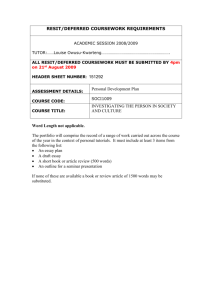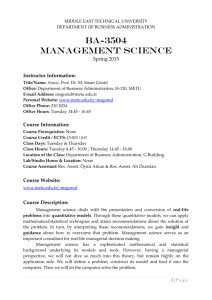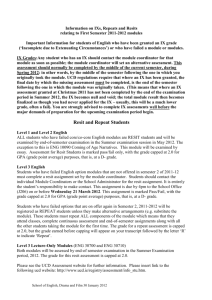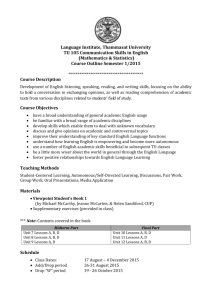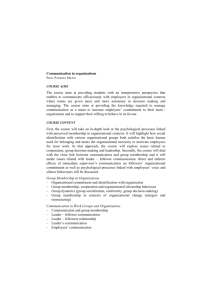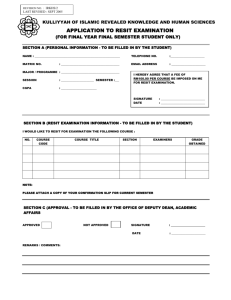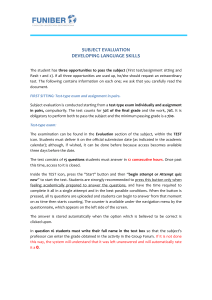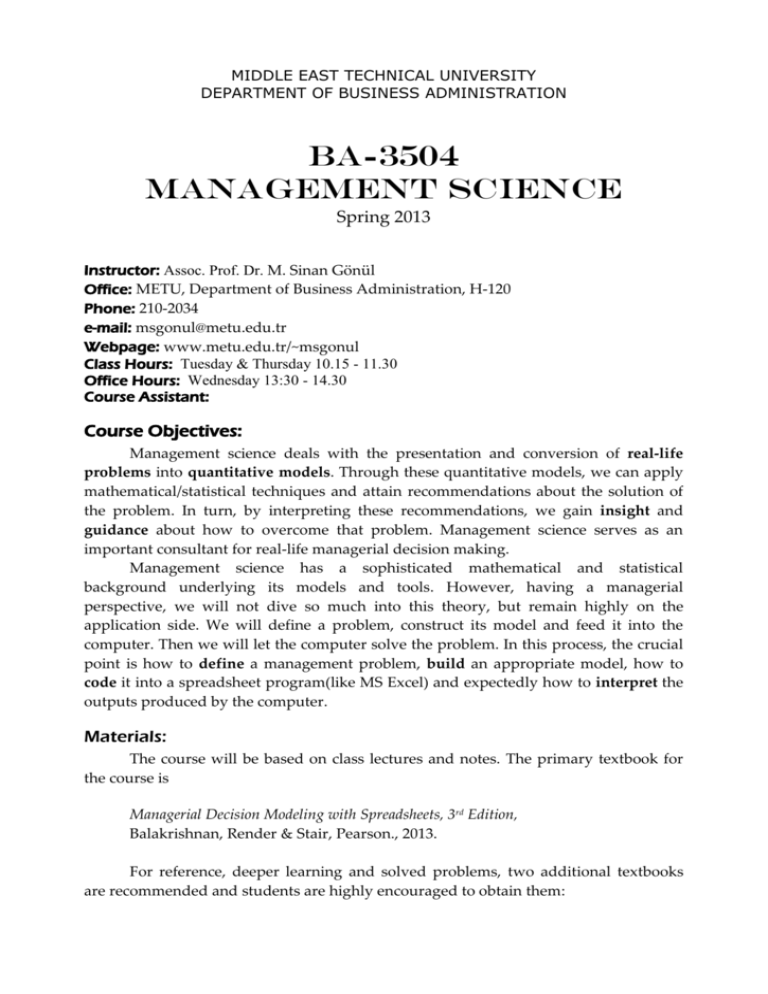
MIDDLE EAST TECHNICAL UNIVERSITY
DEPARTMENT OF BUSINESS ADMINISTRATION
BA-3504
Management Science
Spring 2013
Instructor: Assoc. Prof. Dr. M. Sinan Gönül
Office: METU, Department of Business Administration, H-120
Phone: 210-2034
e-mail: msgonul@metu.edu.tr
Webpage: www.metu.edu.tr/~msgonul
Class Hours: Tuesday & Thursday 10.15 - 11.30
Office Hours: Wednesday 13:30 - 14.30
Course Assistant:
Course Objectives:
Management science deals with the presentation and conversion of real-life
problems into quantitative models. Through these quantitative models, we can apply
mathematical/statistical techniques and attain recommendations about the solution of
the problem. In turn, by interpreting these recommendations, we gain insight and
guidance about how to overcome that problem. Management science serves as an
important consultant for real-life managerial decision making.
Management science has a sophisticated mathematical and statistical
background underlying its models and tools. However, having a managerial
perspective, we will not dive so much into this theory, but remain highly on the
application side. We will define a problem, construct its model and feed it into the
computer. Then we will let the computer solve the problem. In this process, the crucial
point is how to define a management problem, build an appropriate model, how to
code it into a spreadsheet program(like MS Excel) and expectedly how to interpret the
outputs produced by the computer.
Materials:
The course will be based on class lectures and notes. The primary textbook for
the course is
Managerial Decision Modeling with Spreadsheets, 3rd Edition,
Balakrishnan, Render & Stair, Pearson., 2013.
For reference, deeper learning and solved problems, two additional textbooks
are recommended and students are highly encouraged to obtain them:
Introduction to Management Science with Student CD, 4th Edition,
Frederick S. Hillier, Mark S. Hillier, McGraw-Hill Publications. 2008.
Quantitative Analysis for Management, 10th Edition,
Render, Stair & Hanna, Pearson-Prentice Hall, Inc., 2009.
The software we will frequently use:
MS Excel with Solver add-in, GLP(Graphic Visualization Program), RiskSim.
Course Policy:
There will be two midterms and a final examination. The exams will consist of
problems of model construction, true/false questions, multiple choice questions, and
computer output interpretations. Tentative weights for these will be 30% for the first
midterm, 30% for the second midterm, 25% for the final exam and 15% for the other
class related stuff (i.e., homeworks, case studies, in-class assignments, and/or business
competitions)
Of course you are expected to attend the lectures regularly. To achieve a real
understanding of any course taught, attendance is a must. The lectures will be full of
insights, shortcuts, hints and examples, which can never be learnt from the textbooks or
lecture notes. Therefore, come to class if you are ALIVE!!
Another crucial point for success in this course is practice, LOTS OF PRACTICE.
This is the KEY!!! I’m certain that you will perfectly understand every problem solved
during lectures and recitations, but that will remain quite limited. They won’t be
enough for the exams. When it comes to solving problems on your own, you need firsthand experience and the consequent proficiency. And this could only be achieved by
solving a lot of problems. Therefore, it is imperative that you acquire the required
textbook(s) and start solving end-of-chapter problems immediately.
In case you cannot attend one of the examinations, if and only if you can
present an official (dean's or president's office approved) excuse or METU Medical Center
certified Health Report, you will be eligible to a make-up examination. There will be one
single, comprehensive and classical make-up examination during the final period and
it will be counted towards whichever exam(s) you are missing.
Another important warning is about the status of the ‘resit’ examination. Resit
examination is neither an alternative to the final exam (i.e. a second final exam) nor a way to
improve your letter grade. You can only take it if you fail the course with ‘FD’ or ‘FF’
grade, not in any other condition. You cannot enter the resit exam if you eventually
passed the course with a ‘DD’ or higher grade (even if you got a low mark from the
final exam). Not participating in the final exam and trying to fail the class in order to
enter the resit examination is not a viable option. The resit examination will be
comprehensive, detailed and will inquire advance knowledge and understanding, so
any student is strongly advised to participate in the normal semester examinations and
not to try any ‘monkey business’ with the resit.
Tentative Subject List:
I.
Introduction to management science
II.
Linear Programming (LP), the graphical method
III.
Linear Programming applications and examples
IV.
Network problems
Review & Midterm 1
V.
Sensitivity analysis
VI.
Integer Programming
VII.
Goal Programming
Review & Midterm 2
VIII.
Nonlinear Programming
IX.
Simulations


